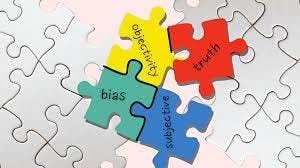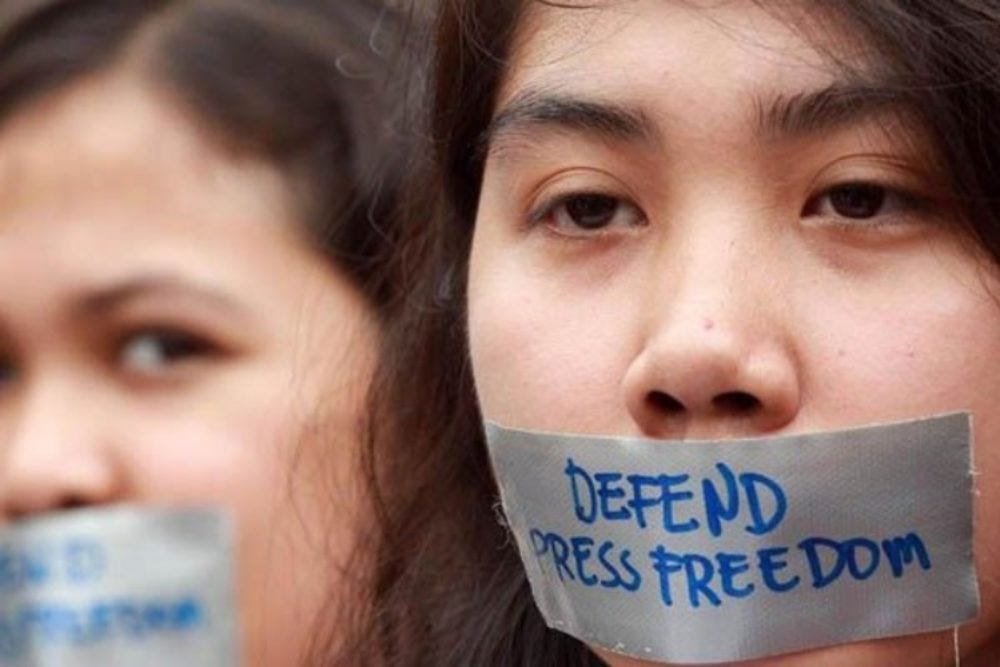
Couples who have been married a long time repeat the same arguments again and again. Denied resolution, they bicker over a husband’s habit of putting keys and wallets on shelves meant for artwork. They fight over whether he listens enough to her. They scrap over whether she is too critical. The arguments grow so familiar that they should, perhaps, be numbered so a wife can say “No. 13,” instead of berating the husband over the wallet, or “No. 17” over the listening issue, perhaps “No. 3” over whether she criticizes too much.
Some publications have sought to be helpful in seeking a way out of the never-ending battles. See the Guardian on this.
Lately, we’ve seen a similar dynamic at work in the argument over journalistic objectivity. Journalists and some non-journalists have beaten this horse for decades and lately the argument is getting a fresh airing by a generation that, apparently, is discovering the debate anew.
The latest missile to fly comes from A.G. Sulzberger, publisher of The New York Times, whose long discussion appears in the Columbia Journalism Review. To boil it down, he argues that objectivity should remain as a journalistic ideal. He argues: “I continue to believe that objectivity—or if the word is simply too much of a distraction, open-minded inquiry—remains a value worth striving for.”
But he avoids the term, mostly characterizing it as a hoary notion espoused by philosopher and journalist Walter Lippmann, who detailed the objectivity idea in the early decades of the last century. Indeed, Sulzberger prefers that media instead regard itself instead as “independent.” Sulzberger’s view: “But independence, the word we use inside the Times, better captures the full breadth of this journalistic approach and its promise to the public at large.”
By independent, he means reporting without fear or favor, as his great-great-grandfather put it, enshrining the ideal so much that it became the motto of The Times.
“It means Independence is the increasingly contested journalistic commitment to following facts wherever they lead. It places the truth—and the search for it with an open yet skeptical mind—above all else,” Sulzberger writes. “Independence asks reporters to adopt a posture of searching, rather than knowing. It demands that we reflect the world as it is, not the world as we may wish it to be. It requires journalists to be willing to exonerate someone deemed a villain or interrogate someone regarded as a hero. It insists on sharing what we learn—fully and fairly—regardless of whom it may upset or what the political consequences might be.”
This eloquent round of the argument was preceded by similar thoughts from Martin Baron, a former Washington Post executive editor. In late March, he weighed in with a straightforward – if similarly nuanced — defense of objectivity, relying on the rhetorical device of comparing journalists to professional of various sorts. The public demands objectivity in judgments by judges, police officers, government regulators and, perhaps most persuasively, by doctors, he argued.
“We want doctors to be objective in their diagnoses of the medical conditions of their patients,” Baron wrote. “We don’t want them recommending treatments based on hunches or superficial, subjective judgments about their patients. We want doctors to make a fair, honest, honorable, accurate, rigorous, impartial, open-minded evaluation of the clinical evidence.”
Neither Baron nor Sulzberger were naïve in their contentions, though. They acknowledged the arguments that reporters’ backgrounds shaped their viewpoints and their familiarity or unfamiliarity with communities they write about would be important. They recognized the problems posed by bias.
Still, Baron suggested that certain practices, well-honed by earlier generations of journalists, can elevate one above the limits. Also citing Lippman, Baron wrote: “Our job as journalists, as he saw it, was to determine the facts and place them in context. The goal should be to have our work be as scientific as we could make it. Our research would be conscientious and careful. We would be guided by what the evidence showed. That meant we had to be generous listeners and eager learners, especially conscious of our own suppositions, prejudices, preexisting opinions and limited knowledge.”
And Baron defined objectivity in negative terms, arguing: “Objectivity is not neutrality. It is not on-the-one-hand, on-the-other-hand journalism. It is not false balance or both-sidesism. It is not giving equal weight to opposing arguments when the evidence points overwhelmingly in one direction. It does not suggest that we as journalists should engage in meticulous, thorough research only to surrender to cowardice by failing to report the facts we’ve worked so hard to discover.”
“The goal is not to avoid criticism, pander to partisans or appease the public. The aim is not to win affection from readers and viewers. It does not require us to fall back on euphemisms when we should be speaking plainly. It does not mean we as a profession labor without moral conviction about right and wrong.”
Putting the ideas positively, Baron echoed what journalism teachers have taught for years. “The idea is to be open-minded when we begin our research and to do that work as conscientiously as possible,” he held. “It demands a willingness to listen, an eagerness to learn — and an awareness that there is much for us to know. We don’t start with the answers. We go seeking them, first with the already formidable challenge of asking the right questions and finally with the arduous task of verification.”
These spirited and much-detailed arguments were all kickstarted anew in January by Leonard Downie Jr. His view, distilled, goes like this: we all are prisoners of our racial, gender, socio-economic and political backgrounds and thus cannot hope to report objectively on anything, so why bother trying? Instead, just own up to the biases and, indeed, own them.
Downie, another former executive editor at The Washington Post who now is a professor at Arizona State University, argued in a Washington Post piece that objectivity is obsolete. He and a colleague quizzed newspeople and concluded: “What we found has convinced us that truth-seeking news media must move beyond whatever ‘objectivity’ once meant to produce more trustworthy news. We interviewed more than 75 news leaders, journalists and other experts in mainstream print, broadcast and digital news media, many of whom also advocate such a change. This appears to be the beginning of another generational shift in American journalism.”
He suggested that one’s biases can’t be readily shelved and that identity is central.
“But increasingly, reporters, editors and media critics argue that the concept of journalistic objectivity is a distortion of reality,” Downie wrote. “They point out that the standard was dictated over decades by male editors in predominantly White newsrooms and reinforced their own view of the world. They believe that pursuing objectivity can lead to false balance or misleading ‘bothsidesism’ in covering stories about race, the treatment of women, LGBTQ+ rights, income inequality, climate change and many other subjects. And, in today’s diversifying newsrooms, they feel it negates many of their own identities, life experiences and cultural contexts, keeping them from pursuing truth in their work.”
Indeed, newsrooms need to “move beyond” objectivity, he argued, though just how that would look seemed a bit gauzy.
“We urge news organizations to, first, strive not just for accuracy based on verifiable facts but also for truth — what Carl Bernstein and Bob Woodward have called ‘the best obtainable version of the truth.’ This means original journalism that includes investigating and reporting on all aspects of American life.”
These debates, including the question of whether to deep-six the term “objectivity,” remind me of the contention of my former editor at BusinessWeek, Stephen Shepard. Because BW was a magazine – a venue in which readers expected a point of view in coverage – Shepard maintained that fairness was really the attainable goal. Our reporters were not akin to cameras, unblinkingly recording reality, but rather we were making judgments constantly. But our judgments and arguments had to be fact-based and fair to all views involved.
Demonstrating a few years earlier just how old this argument is, I wrote about this all in an academic piece published in 2015 in Journalism and Mass Communication Educator. The piece detailed the development of the objectivity ideal –- which is really only about a century old — and the arguments that have raged about it. The debate, as I say, is hardly new.
The bottom line, I believe, is that objectivity is a myth and an ideal. It is as unattainable as the beauty of a Greek god or goddess — but that doesn’t mean we can’t keep trying, striving to reach the grandeur of a David or the loveliness of an Athena.
We owe it to readers to report the facts thoroughly and fairly, acknowledging differing views. We need to pursue the truth as best we can determine it, quoting responsible voices on all sides of the issues we write about. That doesn’t mean showcasing “alternative facts,” or failing to call out misstatements or untruths (indeed, Trump coverage is a sorry example of the need to make such callouts). And it does mean reporting on things that might go against one’s own views and doing so well and with appropriate distance.
But we also can’t forget that it is often outrage at or discomfort with things we cover that drive us. We get angry at injustice. We are stirred to write about wrongdoing. Why? Because we judge that it’s wrong. And it may be that who we are informs our passion or judgment about what is right and wrong. That is hardly objective, but it can make for great journalism.
There is much wisdom in the pieces by Sulzberger and Baron and, it must be admitted, in the Downie piece — even if one disagrees with his conclusions. Reflecting the journalistic traditions these three were reared in, the arguments they make are balanced, thorough and smart. They are worth pondering.






